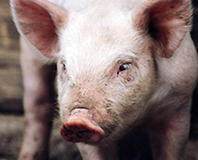Read the latest information on
Foot-and-mouth disease
 A deadly disease of pigs has animal health officials around the world on high alert, and for good reason. African Swine Fever (ASF) continues to spread in Europe and Asia, with significant herd health and trade implications for pig farmers in affected countries.
A deadly disease of pigs has animal health officials around the world on high alert, and for good reason. African Swine Fever (ASF) continues to spread in Europe and Asia, with significant herd health and trade implications for pig farmers in affected countries.
The ASF virus has been endemic in sub-Saharan Africa for nearly a century, having been first identified in Kenya in 1921, and outbreaks have occurred in parts of Eastern Europe for over a decade.
However recent outbreaks in Belgium and China, far from known infected zones, have demonstrated that ASF can jump significant distances, spread by both wild pigs and human activity to infect pig populations hundreds to thousands of kilometres apart.
While the Australian Government works hard to prevent ASF entering the country, Animal Health Australia (AHA) are urging pig owners to be on the lookout for unusual signs of diseases.
“This is a disease which can have a 100% mortality rate, with no available vaccine or treatment” said Dr Rob Barwell, Senior Manager Biosecurity at AHA.
“ASF typically results in high temperatures, along with lethargy, nasal and ocular discharge, breathing difficulties and skin lesions.
“It’s also possible for animals to die suddenly, showing no symptoms.”
ASF virus is spread in a number of ways, with direct contact being the biggest concern for commercial piggeries, along with contaminated vehicles, clothing, footwear and equipment. Ticks and flies are also capable of spreading the virus, as are wild pigs.
The highly infectious nature of ASF means that, once infected, entire herds need to be culled to prevent further spread.
“This is a disease which could devastate our pig industries to the tune of hundreds of millions of dollars in control costs, culled stock and loss of markets,” said Dr Barwell.
“We’ve never had a case of ASF in Australia, and now is the time to get serious about protecting our pig herds while we can still make that claim.”
Some cases in Europe are suspected to have originated from infected meat which was fed, deliberately or by accident, to wild pigs. Dr Barwell noted that feeding meat scraps (from any animal) to pigs is a high risk pathway for disease to enter the country.
“This kind of feed, which we call swill, has been linked to a number of major disease outbreaks internationally,” Dr Barwell said.
“In Australia, imported meat products must meet strict biosecurity requirements, but this doesn’t mean there’s no risk of bringing new diseases into the country.
“For this reason, swill feeding is against the law in every Australian state and territory.”
Sound biosecurity measures at the farm gate are also vital. Whether you have a commercial piggery or a pet pig, extreme care should be taken with visitors returning from overseas, particularly if they have visited rural areas and especially if returning from an infected country.
“Any biosecurity measure is worthwhile, no matter how simple or how complex,” said Dr Barwell.
“These things should be caught at the border, but that doesn’t mean you can’t protect yourself, too. Your biosecurity regime might be make or break for your property in the event of an outbreak.”
Unusual diseases and symptoms can be reported to the Emergency Animal Disease Hotline on 180 675 888.
Useful Links: